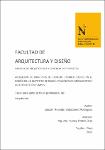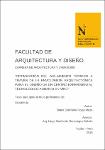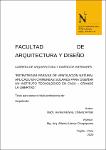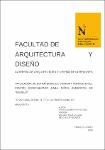| dc.contributor.advisor | Pretell Díaz, Nancy | |
| dc.contributor.author | Valladares Rodriguez, Lincoln Rolando | |
| dc.date.accessioned | 2022-01-31T16:42:31Z | |
| dc.date.available | 2022-01-31T16:42:31Z | |
| dc.date.issued | 2021-12-08 | |
| dc.identifier.citation | Valladares, L. R. (2021). Aplicación de principios de confort térmico pasivo en el diseño de un instituto de rehabilitación para drogadictos y alcohólicos en Tumbes [Tesis de licenciatura, Universidad Privada del Norte]. Repositorio de la Universidad Privada del Norte. https://hdl.handle.net/11537/29231 | es_PE |
| dc.identifier.other | 720.284 VALL 2021 | es_PE |
| dc.identifier.uri | https://hdl.handle.net/11537/29231 | |
| dc.description.abstract | Los centros de tratamiento y rehabilitación para adictos, son centros prestadores enfocados al servicio terapéutico para personas con problemas de drogadicción y alcoholismo causados por el consumo excesivo de sustancias que afectan el sistema nervioso central. Por lo que, la presente investigación propone el diseño arquitectónico de un instituto de rehabilitación en el departamento de Tumbes, con el objetivo de validar la hipótesis en la aplicación de los principios del confort térmico pasivo en el instituto debido a las altas temperaturas de la ciudad. Asimismo, la tesis cuenta con cinco capítulos que permite identificar el problema real, desarrolla el sustento teórico, muestra la estructura de la investigación y la propuesta arquitectónica, demostrando descriptivamente como la variable condiciona e incide al diseño de la nueva edificación. De esta manera, la aplicación de la variable confort térmico pasivo, se valida con antecedentes, referentes teóricos y análisis de casos arquitectónicos existentes, para obtener los criterios y aplicarlos en el diseño. La investigación logra aplicar los principios como ventilación cruzada, mediante aberturas en fachadas a 90º y 45º respecto a la dirección del viento, aberturas de 1/3 y 2/3 de entrada y salida respectivamente con relación al área total del muro; enfriamiento del aire, mediante espacios internos centrales para piletas y patios ajardinados; protección solar, mediante lamas, aleros y volados en fachadas; y orientación de la forma arquitectónica respecto a la ruta solar y corriente del aire. Finalmente, la investigación determinó la aplicación de los principios de confort térmico pasivo en el instituto de rehabilitación. | es_PE |
| dc.description.abstract | Treatment and rehabilitation centers for addicts are provider centers focused on therapeutic service for people with drug addiction and alcoholism problems caused by excessive consumption of substances that affect the central nervous system. Therefore, this research proposes the architectural design of a rehabilitation institute in the department of Tumbes, with the aim of validating the hypothesis in the application of the principles of passive thermal comfort in the institute due to the high temperatures of the city . Likewise, the thesis has five chapters that allow to identify the real problem, develop the theoretical support, show the structure of the research and the architectural proposal, descriptively demonstrating how the variable conditions and affects the design of the new building. In this way, the application of the passive thermal comfort variable is validated with antecedents, theoretical references and analysis of existing architectural cases, to obtain the criteria and apply them in the design. The research manages to apply the principles such as cross ventilation, through openings in facades at 90º and 45º with respect to the wind direction, 1/3 and 2/3 inlet and outlet openings respectively in relation to the total area of the wall; air cooling, through central internal spaces for pools and landscaped patios; solar protection, through slats, eaves and overhangs on facades; and orientation of the architectural form with respect to the solar path and air current. Finally, the research determined the application of passive thermal comfort principles in the rehabilitation institute. | es_PE |
| dc.description.uri | Tesis | es_PE |
| dc.format | application/pdf | es_PE |
| dc.format | application/msword | es_PE |
| dc.language.iso | spa | es_PE |
| dc.publisher | Universidad Privada del Norte | es_PE |
| dc.rights | info:eu-repo/semantics/openAccess | es_PE |
| dc.rights | Atribución-NoComercial-CompartirIgual 3.0 Estados Unidos de América | * |
| dc.rights.uri | https://creativecommons.org/licenses/by-nc-sa/3.0/us/ | * |
| dc.source | Universidad Privada del Norte | es_PE |
| dc.source | Repositorio Institucional - UPN | es_PE |
| dc.subject | Diseño estructural | es_PE |
| dc.subject | Diseño arquitectónico | es_PE |
| dc.subject | Proyectos arquitectónicos | es_PE |
| dc.subject | Espacios en arquitectura | es_PE |
| dc.title | Aplicación de principios de confort térmico pasivo en el diseño de un instituto de rehabilitación para drogadictos y alcohólicos en Tumbes | es_PE |
| dc.type | info:eu-repo/semantics/bachelorThesis | es_PE |
| thesis.degree.grantor | Universidad Privada del Norte. Facultad de Arquitectura y Diseño | es_PE |
| thesis.degree.level | Título Profesional | es_PE |
| thesis.degree.discipline | Arquitectura y Gerencia de Proyectos | es_PE |
| thesis.degree.name | Arquitecto | es_PE |
| dc.publisher.country | PE | es_PE |
| dc.subject.ocde | https://purl.org/pe-repo/ocde/ford#6.04.08 | es_PE |
| thesis.degree.program | Pregrado | es_PE |
| dc.description.sede | Trujillo El Molino | es_PE |
| renati.advisor.dni | 18029416 | |
| renati.advisor.orcid | https://orcid.org/0000-0003-4326-7584 | es_PE |
| renati.author.dni | 48539139 | |
| renati.discipline | 731116 | es_PE |
| renati.juror | Zelada Quipuzco, Ruth Melissa | |
| renati.juror | Chavez Olivos, Roberto Octavio | |
| renati.juror | Torres Loyola, Elmer Miky | |
| renati.level | https://purl.org/pe-repo/renati/level#tituloProfesional | es_PE |
| renati.type | http://purl.org/pe-repo/renati/type#tesis | es_PE |








